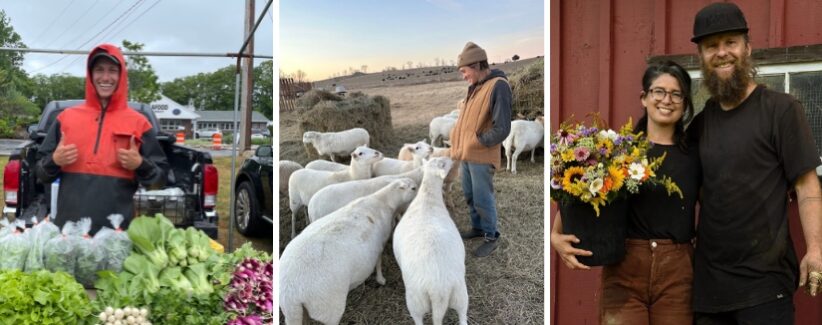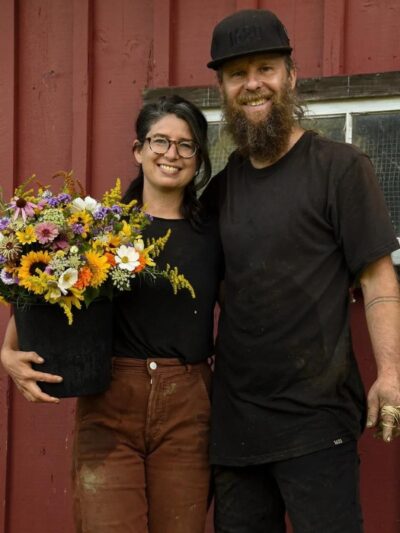Where Are They Now? Catching Up with Gaining Ground Alumni

Our mission doesn’t end at the edge of the farm. Instead, we aim to cultivate our values within each person who visits Gaining Ground—including the growers who strengthen their incredible talents on our crew. When farmers leave the organization, they take those values with them, working to create the future we envision collectively, in which everyone has equitable access to sustainably grown produce. Here’s where some of our alumni are today!
Jared Kimler

Seasons at Gaining Ground – 2018–19 (Field Crew)
Today Jared lives in Worcester, Mass., where he’s looking to purchase between two and three acres of land to cultivate long-term, abiding by no- or low-till principles.
Since leaving Gaining Ground Jared has built three profitable no-till farms: Wild Flower Farm in Maryland; a market garden on Cape Cod; and a larger operation on leased land in Asheville, N.C., where he and a friend ran a 100-member CSA, sold at markets, and maintained wholesale clients.
“At Gaining Ground, I learned how to work on a team, with solid communication. It was also my first exposure to no-till agriculture. I felt so confident in my ability to grow vegetables from Gaining Ground that I thought, ‘I can do it on my own.’ When we established the farm on Cape Cod, I used the same no-till practices I learned at Gaining Ground, and pushed the limit to see how profitable we could be. It was cool to dial in, be super intensive with it, and build on a strong foundation of skills.”
He encourages young farmers “to attend as many workshops as you can, and meet other people. Even if you don’t think you can take anything away from the workshop—making connections with other farmers is huge.”
Jared’s hope for the future of agriculture: “Two words—more farms.”
Kim Schmidt

Seasons at Gaining Ground – 2018–19 (Field Crew), 2020–21 (Greenhouse & Flower Production Manager)
Today Kim lives in Davenport, Iowa, where she manages flower production, including a flower CSA, at Rhubarb Botanicals Farm & Apothecary.
Since leaving Gaining Ground Kim and her partner have relocated to Iowa, where she built upon a decade of farm experience by growing vegetables at Echollective Farm, just outside Iowa City. There, Kim supported a 150-member CSA and wholesale restaurant accounts, while helping to manage young farmers in the field. Along the way, she got to know the community better and connected with her current employer.
“At Gaining Ground, I realized how important it is to engage community volunteers. I was also impressed by the bonds I shared with female-identifying growers. Seeing women in agriculture was really important, and marked a big shift for me. Now I seek it out. Gaining Ground fulfilled a bunch of my interests: a rural-adjacent farm meeting food access issues, in the last phase of transitioning to no-till, so I could see how that looked. I learned a lot of techniques I hadn’t learned at other farms. Gaining Ground is also where I got super interested in flower production—meeting more than basic needs of food, water, and shelter, to help people access beauty, which is also a human need.”
She encourages young farmers to “know your value. There’s a lot of romanticizing about farming and, unfortunately, a lot of farms that can take advantage of young labor. Observe a farm’s actions before accepting a gig. Be excited. Fall in love with the beauty and surprise of plants. And be prepared for the challenges. Respect your own boundaries.”
Kim’s hope for the future of agriculture: “For awareness of farming to infiltrate our lives to the point that we don’t see anything else in society without it, and so we all understand the skilled labor and sacrifice that people bring to farming.”
Doug Wolcik

Seasons at Gaining Ground – 2013–14 (Assistant Manager), 2015–16 (Co-Manager), 2017–20 (Farm Manager)
Today Doug and partner Kayleigh Boyle own and operate Breadseed Farm in Craftsbury, Vermont, a one-acre, no-till farm that sells at three of the largest markets in the state: Stowe, Waitsfield, and Montpelier. They also run a 30-family vegetable and flower CSA, and sell to five local wholesale accounts.
After leaving Gaining Ground Doug got right to work on Breadseed, starting seedlings in the greenhouse just three months later. But he said the farm “was very hard to leave. It was all good all the time, which is unusual.”
“At Gaining Ground, I met all the influential people and mentors who had the greatest impact on my life. Kayleigh and I basically redesigned and laid out Gaining Ground’s no-till market garden. We built multiple high tunnels and got to see the barn come together. Now we’re doing all those things at Breadseed, and we’re not making mistakes or spending extra money. Building a farm has been easy. It almost feels like it’s our second time around. Gaining Ground is in our vocabulary every day, four years later, whether it’s about farming, business, or something personal.”
His advice to young farmers is: ”Find a mentor and a spark. Find a place where you feel called to the land, the people, or the way the farm is run. Gain all the technical skills you can before you do it on your own.”
Doug’s hope for the future of agriculture: “That we push back from the machine. We can achieve more food sovereignty with a lot more small farms producing, and more people committing to winter growing.”
Kayleigh Boyle (pictured above with Doug)
Seasons at Gaining Ground – 2009–10 (Assistant Grower), 2011–16 (Farm Co-Manager)
Today Kayleigh co-owns Breadseed Farm in Craftsbury, Vt., with partner Doug Wolcik, which marked its first season in 2021. Within three years, they’ve turned a profit.
After leaving Gaining Ground Kayleigh worked at Gibbet Hill Farm in Groton, Mass., managing the restaurant’s market garden for four years before she and Doug purchased their land in Vermont.
At Gaining Ground “I learned pretty much everything about myself, including that I really love the informal teaching relationship of working with volunteers. When people came to Gaining Ground, I got to host them, hear their farm stories, and experience their excitement as they learned about our mission and how things grow. It was an energy-giving source for me. We’ve made that part of the Breadseed mission from Day 1, like hosting NOFA VT workshops and opening the farm to the community.”
Her advice to young farmers is: “It’s possible to run a farm for a living. In Eastern Massachusetts it’s difficult because of land access barriers and prices. But it’s a viable career.”
Kayleigh’s hope for the future of agriculture: “That we stay small. I’d love to see more small farmers growing intensively on small, diversified pieces of land. That really is the way forward, to feed the community in a climate smart way.”
Photo of Doug and Kayleigh by Sophie O’Brien.